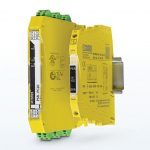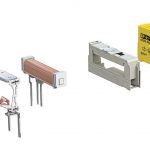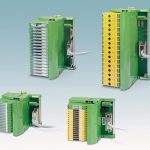Safe coupling modules are often an essential part of systems in the process industry. To save valuable space in the control cabinet, Phoenix Contact has developed narrow, safe coupling relays with force-guided contacts that offer the same performance as devices with standard design widths.
Author Wolfgang Boll Safety Product Management, Phoenix Contact Electronics
Safe control systems are standard components, especially in the process industry. Safety instrumented systems (SIS) fulfil various safety functions. They allow field devices to be switched either off (ESD – emergency shut-down) or on (F&G – fire and gas), with many new applications recently emerging for the latter. Safe coupling modules, which are likewise used in these applications, mainly serve to perform electrical isolation and power amplification. The devices are employed whenever users need to protect their safe digital output cards by means of electrical isolation or the corresponding output card is unable to supply the power required to operate the field device. Safe coupling modules also interconnect the different signal levels of different safe control systems.
Low energy, high power
Although safe coupling modules are essential in many systems, users sometimes see them as a necessary evil that takes up additional space in the control cabinet and must be integrated into the application. Especially when it comes to integrating additional components into safety loops, the requirements made on the manufacturers of safe systems have continued to rise in recent years. The higher demands include compliance with pertinent standards such as IEC 61508 or IEC 61511, which describe procedures for preventing systematic errors as well as ways to correct random errors. They also discuss a number of technical details that ensure efficient interaction between the safe control system, the coupling module and the actuator. Factors such as the design width, approvals and diagnostics of safe coupling modules are of particular importance in this context. They are key priorities when new devices are developed.
With its PSRmini product family, Phoenix Contact now provides a very lean solution for SIL-certified coupling modules. The force-guided contacts, which are certified according to EN 50205, offer proven and tested safety functions in a compact space with a design width of only 6 mm. Especially in the process industry, new projects or extensive retrofits often involve coupling a large number of digital signals. Thanks to the significantly reduced size of the safe coupling modules, entire control cabinets and their associated costs can now be eliminated. The relevant costs in this context include wiring as well as the floor space needed for the control cabinets. The minimal space requirements of the safe coupling modules are an immense advantage wherever control cabinet space is very scarce and thus expensive – for example, on offshore platforms. The small design width of the PSRmini modules is a result of new relay technology developed by Phoenix Contact. Other distinguishing features of the slim elementary relay built into the coupling module include low energy consumption as well as high power and system availability.
Direct use in Zone 2 hazardous areas
Some time ago, the Phoenix Contact development team began working on a new elementary relay featuring forced guidance with one normally open (NO) and one normally closed (NC) contact. Although the component has a design width of just 6 mm, it provides the same performance as conventional elementary relays based on the forced guidance principle. The NC contact is designed for a maximum continuous current of 6 A, which means that it can switch even high loads very reliably. The optimised load contact design also provides high short-circuit strength, while the drive system’s patented operating concept reduces the power consumption.
The development team additionally attached considerable importance to the elementary relay’s reliability. For example, a robust steel spring ensures a constant contact force throughout the service life. The symmetrical solenoid system has proven to withstand any type of mechanical stress. The redundant diagnostic contact likewise contributes to a high level of reliability. By complying with pertinent guidelines, the relay can also be used directly in Zone 2 hazardous areas. After using theory to design the component, the results were veri-fied in an extensive series of practical tests. These efforts were well rewarded: the force-guided elementary relay was granted certifications by TÜV Rheinland and VDE. To achieve the manufacturing precision required to meet Phoenix Contact’s stringent quality requirements, both the elementary relay and all of its individual parts are manufactured entirely in-house.
Fully automated proof test
Due to these extensive tests and certifications, safe coupling modules with the integrated force-guided elementary relay can also be utilised in applications that go beyond the normal scope. One example here is G3 conformity according to ISA S71.04-1985 for use in highly corrosive atmospheres. This is realised through a well-tuned printed circuit board design in combination with a carefully applied protective coating. The safe coupling relays moreover have IEC Ex certification, which simplifies distributed applications extending into the haz-ardous area. When developing the coupling relay, special importance was placed on diagnostics. The repeat tests prescribed by the standards can be performed easily and visually, directly on the device. This eliminates the need for the complicated manual measurements that are often still unavoidable when using standard relays with forced guidance which are not compliant with EN 50205. Most safety instrumented systems operate with a test procedure which ensures that their digital output can be switched on or off. The tests also check whether the wiring between the digital output and the field device has any errors and make sure the controlled load is still present. Some devices in the PSRmini product family can use the control system test procedure to transmit potential errors. If the PSRmini device detects an error, it changes its input impedance such that the expectations of the higher-level control system are not met and the error is signalled via the respective channel in the control system. This enables the repeat test, the so-called proof test, to be performed in a fully automated way. It also reduces downtimes – and thus increases efficiency – without the additional expenditure generated by the otherwise essential hardware and its installation. Users can also choose a coupling module that provides integrated self-locking in the event of an error. In this case, an error detected after the module restarts will cause the release contacts to remain open, thus preventing the field device from being activated.
Quick start-up
Ample time needs to be planned for starting up the systems or system components. Correcting wiring errors accounts for a large proportion of this time. Users can now combine the safe coupling relays in the PSRmini product family with a matching termination carrier. The mod-ule carrier unites the advantages of a plug & play solution with the technical features of Phoenix Contact’s modular switchgear technology to form an efficient system wiring concept. A diode-decoupled power supply is installed on the termination carrier’s me- chanically decoupled circuit board. There is also a relay with a floating contact for indicating any malfunctions in the power supply. All the relevant parameters and certificates are available for simple loop calculations, project planning and documentation.
Hall 11.1, Booth A27
cpp-net.com/0215440
Share:










